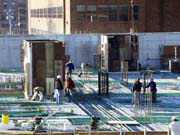Lawyers for the Stevens Institute of Technology were in a Jersey City courtroom on Friday, Jan. 3 to argue that the private university should be allowed to continue work on a controversial construction project on the school’s campus.
On Dec. 31 Hoboken Mayor David Roberts, through the city’s construction officer, revoked the “first certificate of zoning compliance” and issued a “stop construction order” against Stevens as it relates Babbio Center of Technology Management at the corner of Sixth and River streets.
Construction had begun in March on the Babbio Center, but some concerned residents and politicians said it looked like the private university was working on a 725-car garage that had not been approved yet. The university has gotten approval only for construction of a six-story building to accommodate classrooms, lecture halls, administrative and faculty offices, a restaurant, classrooms, and a parking lot.
An investigation by noted land use attorney Michael Pane determined that Stevens was building beyond what they had received approval for, and they were asked in November of 2002 by Roberts to stop work on the garage portion of the site, but were allowed to continue work on the Babbio Center’s foundation.
After some members of the public weren’t sure whether Stevens was still working on the garage or just the Babbio Center, and pressure from the Planning Board members and local residents was placed on Roberts, Roberts decided to issue an official stop work order on Dec. 31.
That decision had lawyers from the university rushing into the courtroom of New Jersey Superior Court Judge Mark J. Nelson to argue that the mayor’s order was premature and unwarranted and that issuing a stop work order causes “immediate and irreparable injury to the school.” In his order, Judge Nelson agreed and ruled that until the city can “show cause” for stopping construction, the university is permitted to continue working on the site.
According to the ruling, until there is a hearing and determination by the court that the city was justified in stopping work, the city is “temporarily enjoined and restrained” from “revoking the First Certificate of Zoning Compliance issued to Stevens and enforcing or taking any other actions with regard to the stop construction order.”
Roberts said Wednesday that he is frustrated with both the judge’s decision and Stevens’ insistence on challenging the city in court.
“I’m very disappointed in the judge’s decision,” said Roberts. “But I’m just as disappointed that [the school] has not taken the city’s position seriously. If they were truly interested in good public relations, this is certainly not the thing you would do.”
At the beginning of last year, the city and Stevens were on good terms, working together on a proposed technology high school for the community. Relations have apparently broken down since then.
Stevens Spokesperson Patrick Berzinski said Wednesday afternoon the school will continue construction as per the judge’s order. He added that beyond that this issue is part of an ongoing a legal action and it is the school’s policy not to comment on current litigation.
End of January hearing
The judge also set a hearing on Jan. 31 at 1:30 p.m. where the city, if it wishes, will be able to “show cause” and present its evidence as to why it believes construction should stop.
But according the Judge Nelson, there is one major caveat for the school. The school is continuing with construction “at its own risk.” That means the court reserves the right to order the school to tear down any subsequent construction if it is ruled that the school is building in violation of the city zoning codes or New Jersey’s land use law.
Roberts said Wednesday that he has not yet decided if the city will continue to pursue the matter in Judge Nelson’s court.
“Right now we are trying to decide what we are going to do,” said Roberts.
What happens now?
Judge Nelson was very clear that Stevens can continue to work, but was also very insistent that the school must still obtain zoning permits from the city for the 725-car garage project.
According to the mayor’s spokesperson, Bill Campbell, the Zoning Board is expected to convene a meeting on the matter shortly, but as of Wednesday, the date had not been set.
The school is also expected to face hurdles in getting such a large garage project approved. Although no formal application for a garage has yet been made, it is anticipated that as many as 10 zoning variances could be needed for the project, some of which could be considered major. The school will have the option of trying to change the area’s zoning by making a request to the Planning Board to review the zoning ordinances that apply to the Stevens campus. Then if the Planning Board members believe the request is worthy, they could make a request that the City Council change the zoning.
The City Council is the only local governing body that has the authority to vote on and change zoning ordinances. Planning Board support for major changes to the zoning of Stevens’ campus might be unlikely, considering the number of board members who have spoken out against the project.
